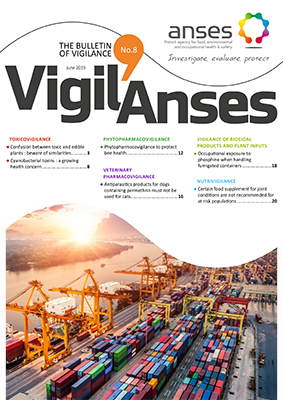Issue 8 OF VIGIL'ANSES
Editorial

Summer will be here soon, and we can spend more time in nature and perhaps pick plants that we believe to be edible. Unfortunately this is not always the case, and nature's deceptions are numerous, as an article in this Vigil'Anses shows. It provides a general overview of the last 7 years of data from the French Poison Control Centres which details the cases of poisoning due to the consumption of toxic plants mistaken for edible plants, with photos to support them, season-by-season.
Another possible inconvenience in warm weather is the contamination of lakes and rivers by cyanobacteria. Poisoning can occur through skin or eye contact, inhalation or ingestion of contaminated water or fish. Although symptoms are generally quite mild, one should be cautious. Maximum safe concentration standards (toxicological reference values) are established by ANSES. An article in this issue of Vigil’Anses provides a general overview of human poisonings over the last twelve years.
ANSES’s phytopharmacovigilance system was presented to you in our 3rd issue and an example of an alert concerning abnormal pesticide residues in apples in issue no. 6. In this latest issue, an article is devoted to bee health and how the phytopharmacovigilance system makes it possible to monitor this, as well as to detect irregularities and propose measures for improvement.
When foodstuffs travel long distances from overseas stored in containers, it is common practice to use phosphide-based insecticides and rodenticides. In contact with moisture, phosphides release phosphine which, when the containers are opened, can cause serious poisoning of personnel. The cases identified by the French Poison Control Centres are described in an article in this issue, as well as the recommended prevention measures.
Medicines for dogs are not intended for cats! They can even be very dangerous for them. Despite numerous warnings from the French National Agency for Veterinary Medicines (ANMV, a division of ANSES), poisonings do persist, although they have been declining sharply. The ANMV provides an update on permethrin-based antiparasitic drugs.
The last article in this issue provides the main conclusions of an ANSES opinion on the risks associated with food supplements used for joint conditions.

